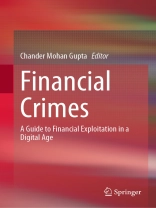The book’s primary purpose is to understand the economic, social, and political impact of financial crimes and earning management on the Indian national economy. The book is divided into four parts that focus on different sectors which lead to financial crimes in a country:
- Financial crimes
- White Collar Crimes
- Cybercrimes
- Creative Accounting
Jadual kandungan
Chapter 1. Human Trafficking And Profiteering: Analysing Its Exploitative Angle Through The Financial Lens.- Chapter 2. Nexus between illegal wildlife trade and financial crime: how to counter it ? Case study in southeast Asia.- Chapter 3. The Financial And Systemic Fraud: An Analytical Study.- Chapter 4. Financial Crises in Sri Lanka: in Search of Reasons, Sufferings and Way Forward.- Chapter 5. Controlling Corruption And Economic Crime In Developing Economies- A Critical Analysis.- Chapter 6. Money Laundering Through The Arbitral Process: Controversial Issues Wait For Solutions.- Chapter 7. Online fraud.- Chapter 8. Cryptocurrency fraud: a glance into the perimeter of fraud.- Chapter 9. Blockchain & Cryptocurrency Frauds: Emerging Concern.- Chapter 10. Cyberspace and Economy: Analysing The Impact of The Contemporary Cyberthreats on the Global Financial Order.- Chapter 11. The impact of accounting fraud which lead to financial crimes.- Chapter 12. Models to Studythe New Age Financial Crimes.- Chapter 13. The Regulatory Landscapes of Ponzi Schemes in India: With Special Reference to State of Tamil Nadu.
Mengenai Pengarang
Dr. Chander Mohan Gupta is an alumnus of Himachal Pradesh University, with 18 years of experience in the corporate and education sector. He holds a master’s in commerce and law and specializes in direct and indirect taxes. He has worked extensively in accounting law ethics and its legal aspects. Several of his research papers were presented in national and international conferences, and a few were published in refereed journals and Scopus. His research focuses on creative accounting and financial crimes.












